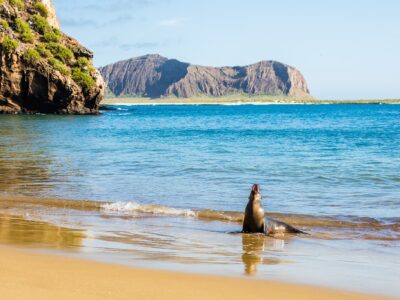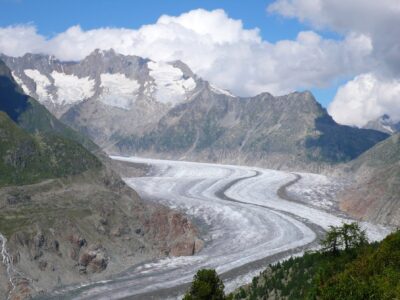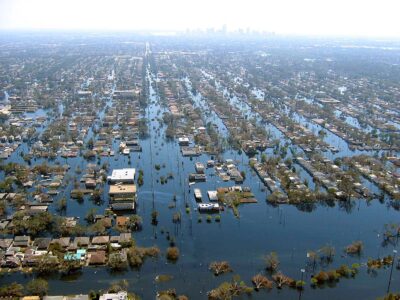A decision last week by the UN Human Rights Committee indicates that if climate impacts worsen in the future, countries may not lawfully return climate migrants to their home states where their right to life is threatened. The decision represents a step forward since climate migrants currently fall outside the scope of international refugee law, and there is no governing framework for climate migration to fill that gap.

The story of the petitioner, Ioane Teitiota, is one of a climate migrant grasping at multiple legal straws in the absence of clear protective measures. Teitiota arrived in New Zealand in 2007, and his residency permit expired in 2010. In 2012 he filed a claim for recognition as a refugee and/or protected person, claiming that because sea level rise had led to land scarcity and environmental degradation in Kiribati, deporting him would violate his right to life under New Zealand’s Immigration Act. Teitiota’s refugee claim was denied in a decision affirmed by New Zealand’s Immigration and Protection Tribunal, High Court, Court of Appeal, and Supreme Court. In 2015, Teitiota was removed to Kiribati.
Shortly thereafter he filed a communication with the UN Human Rights Committee, asserting that New Zealand had violated his right to life under Article 6 of the Covenant on Civil and Political Rights. Teitiota specifically argued that the lack of clean drinking water caused by sea level rise had caused serious health issues in his family, including the blood poisoning of one of his children, and that he had been unable to grow crops.
On January 7, 2020, the committee ruled against Teitiota, reasoning that under Article 6, the risk of an arbitrary deprivation of life must be personal, rather than rooted in a country’s general conditions, except in the most extreme cases. The committee recognized that environmental degradation and climate change constitute serious threats to the ability of present and future generations to enjoy the right to life, but upheld New Zealand’s determination that Teitiota had not provided evidence that he faced any real chance of being harmed in a land dispute, would be unable to grow food or access potable water, or otherwise faced life-threatening conditions.
While the decision is plainly a loss for Teitiota, it also demonstrates that rights-based litigation on climate change continues to gain traction, and may open the door for climate refugee claims down the line. First, though it ultimately dismissed his claim, the committee did rule that Teitiota’s communication was admissible because he sufficiently demonstrated that, due to the impact of climate change and sea level rise on the habitability of Kiribati, he faced a real risk of impairment to his right to life under Article 6 of the Covenant. Moreover, the opinion is not a full-throated endorsement of New Zealand’s decision to deport Teitiota; rather, the committee may only reverse a state party’s determination that is clearly arbitrary or amounted to a manifest error or a denial of justice. In other words, if the committee were assessing Teitiota’s claim in the first instance, it could conceivably have reached a different result.
More importantly, the committee found that without serious national and international action on climate change, impacts could become extreme enough to threaten the right to life, making it unlawful for states receiving climate migrants to turn them away. The committee further concluded that “given that the risk of an entire country becoming submerged under water is such an extreme risk, the conditions of life in such a country may become incompatible with the right to life with dignity before the risk is realized.” Accepting Teitiota’s assertion that sea level rise is likely to render Kiribati uninhabitable within ten to fifteen years, the committee explained that there was sufficient time for intervening acts by the government of Kiribati, with international assistance, to protect its citizens. Without robust national and international action, however, climate change might undermine the right to life, “thereby triggering the non-refoulement obligations” of countries receiving climate migrants.
Finally, two of the committee members filed dissents, concluding that New Zealand’s decision to remove Teitiota was arbitrary, or manifestly erroneous, or a denial of justice. The first dissenter argued that the committee erred by equating “potable water” with “safe drinking water,” and that the onus is on the state party to demonstrate that Teitiota and his family had access to the latter in Kiribati. The second concluded that New Zealand imposed an unreasonable burden of proof on Teitiota to establish the real risk of arbitrary deprivation of life.
The committee’s decision, although a positive step in filling the climate-induced migration protection gap, falls short on two fronts. First, the committee’s interpretation of the threshold of risk creates a perverse outcome, where climate impacts must result in death more regularly before the committee can find a violation of the right to life. The committee determined that the risk to Teitiota and his family did not meet the threshold required to establish that they faced arbitrary deprivation of life under Article 6. Although Teitiota’s wife feared her children drowning in a tidal event or storm surge, the committee decided Teitiota’s family was not in danger because “no evidence had been provided to establish that deaths from such events were occurring with such regularity as to raise the prospect of death occurring to the author or his family members to a level rising beyond conjecture and surmise.” Yet as the dissent notes, “[i]t would indeed be counterintuitive to the protection of life, to wait for deaths to be very frequent and considerable, in order to consider the threshold of risk as met.”
Second, the committee’s determination that “risk must be personal, that it cannot derive merely from the general conditions in the receiving State,” means that only the most severely impacted climate migrants may find relief by claiming enforcement of their right to life. Yet the entire population of Kiribati would be affected if climate impacts rendered the low-lying atoll nation uninhabitable. The fact that Teitiota’s difficulty in accessing safe drinking water and habitable land is shared by other I-Kiribati does not render his situation any more dignified. As the dissent persuasively states, “New Zealand’s action of deporting Teitiota is . . . like forcing a drowning person back into a sinking vessel, with the ‘justification’ that after all there are other voyagers on board.”
Teitiota’s loss exemplifies the difficulty of trying to use the framework of individual rights as redress for collective harm. To date, neither the 1951 Refugee Convention nor the Covenant has granted individual climate migrants the ability to seek protection abroad. In the case of Kiribati, and other low-lying states, population-wide solutions like planned relocation thus remain critical. When low-lying state governments attempt to implement adaptive measures or enact national solutions, however, those efforts count against individual petitioners. The committee, for example, noted that Kiribati was taking steps to address climate change harms through its National Adaptation Programme of Action under the United Nations Framework Convention on Climate Change, and therefore it could not conclude that Kiribati’s actions were inadequate to protect Teitiota’s right to life.
The committee’s decision sends a clear signal that the right to life may require states to refrain from deporting climate migrants if climate impacts worsen. It serves not only as a potential opening for future claims, but also a reminder of the importance of reducing emissions now.
This post was originally published on the blog of Columbia University’s Sabin Center for Climate Change Law.



